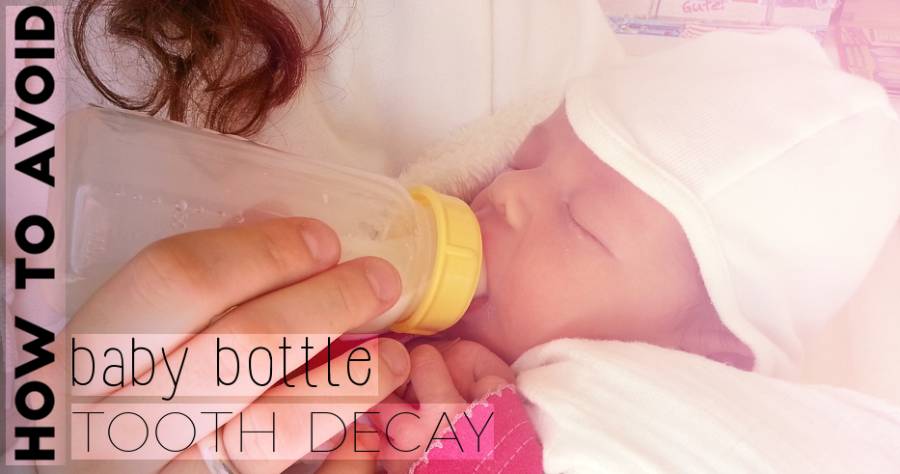
As a parent, you will always be concerned about the health of your child. You will do all the research on the healthiest foods for babies; you’ll study up on the best formulas, and look into the best car seats. You’ll leave no stone unturned in the name of your child’s overall health. Well, here is something you should be aware of when taking into account your child’s oral health.
If you’ve never heard of baby bottle tooth decay, you’re not alone, but it is definitely something you should know about.
“Baby bottle tooth decay is caused by the frequent and long-term exposure of a child’s teeth to liquids containing sugars,” according to the Academy of General Dentistry.
The sugars that cause decay can be found in milk, formula, fruit juice, sodas, and other sweetened drinks. When a baby sucks on a bottle filled with a sugary liquid like milk or formula, the sugar pools in their gums and teeth. The sugar feeds the bacteria in plaque, which leads to tooth decay. The acid in the drinks, as well as the acid in the sugar wears away at the enamel and causes decay.
There are a few ways to prevent this decay and maintain good oral health for your baby. One way to prevent a build up of plaque and erosion-causing acid is to never let your child fall asleep with a bottle. While they sleep, their flow of saliva decreases which allows the sugary substance to linger on the teeth for much longer. If left for too long, it can cause serious decay and damage teeth.
Focus on promoting good oral healthcare with your child early on to prevent decay. Before teeth emerge, use a moistened gauze pad or washcloth to massage the gums and wipe away any lingering sugar. Once teeth emerge, use a soft toothbrush to brush their teeth and take them to regular cleaning appointments.
Another trick is to dilute the sugar-filled bottle contents with water. This helps lower the amount of sugar, and eventually, they can switch to just water.
When it comes to feeding time, make sure that the child finishes and then do your best to prevent tooth infection, pain, extraction, and the development of further damage, by removing as much sugar as possible from the child’s teeth.
Good oral health habits start a lot earlier than you may think. The key to protecting your child’s teeth is to begin an oral health routine early on, and that includes fighting against baby bottle tooth decay. Check out our blog post to learn more about baby bottle tooth decay and how to avoid it.
As a parent, you will always be concerned about the health of your child. You will do all the research on the healthiest foods for babies; you’ll study up on the best formulas, and look into the best car seats. You’ll leave no stone unturned in the name of your child’s overall health. Well, here is something you should be aware of when taking into account your child’s oral health.
If you’ve never heard of baby bottle tooth decay, you’re not alone, but it is definitely something you should know about.
“Baby bottle tooth decay is caused by the frequent and long-term exposure of a child’s teeth to liquids containing sugars,” according to the Academy of General Dentistry.
The sugars that cause decay can be found in milk, formula, fruit juice, sodas, and other sweetened drinks. When a baby sucks on a bottle filled with a sugary liquid like milk or formula, the sugar pools in their gums and teeth. The sugar feeds the bacteria in plaque, which leads to tooth decay. The acid in the drinks, as well as the acid in the sugar wears away at the enamel and causes decay.
There are a few ways to prevent this decay and maintain good oral health for your baby. One way to prevent a build up of plaque and erosion-causing acid is to never let your child fall asleep with a bottle. While they sleep, their flow of saliva decreases which allows the sugary substance to linger on the teeth for much longer. If left for too long, it can cause serious decay and damage teeth.
Focus on promoting good oral healthcare with your child early on to prevent decay. Before teeth emerge, use a moistened gauze pad or washcloth to massage the gums and wipe away any lingering sugar. Once teeth emerge, use a soft toothbrush to brush their teeth and take them to regular cleaning appointments.
Another trick is to dilute the sugar-filled bottle contents with water. This helps lower the amount of sugar, and eventually, they can switch to just water.
When it comes to feeding time, make sure that the child finishes and then do your best to prevent tooth infection, pain, extraction, and the development of further damage, by removing as much sugar as possible from the child’s teeth.